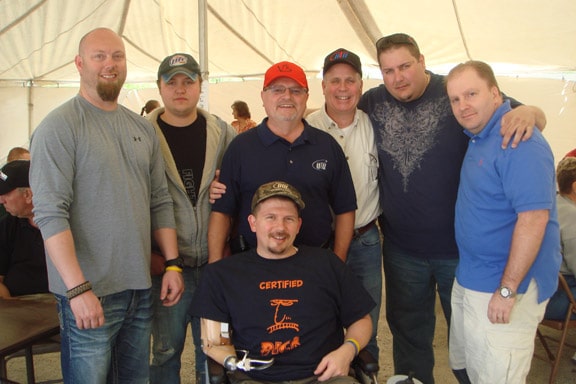When Art Anderson started working for passenger railroads, the Beatles were still together, and everyone still dressed up for work, according to the Chicago Sun-Times.
“Things are a lot more casual these days,” said Anderson, 59, who retires next month after 42 years, the last 20 as a Metra conductor. “You see very few people in a suit and tie anymore, and when you do, you assume they’re an attorney.”
Anderson started his career as a ticket clerk with the Chicago Union Station Co. 1968, after graduating from Senn High School.
(Anderson is a member of Local 281, Milwaukee.)
He moved through a variety of rail jobs, including work in the interlocking tower (where signals are controlled), control center jobs at Amtrak, assistant station manager between 1981 and 1985 and then station manager through 1988, putting him in charge of train operations for the terminal.
His worst day was when Robert Krabec, an off-duty security guard, shot Amtrak baggage handler Marvin Burton to death in 1985.
“I’d known both of these gentlemen since 1968, so it was sad,” Anderson recalled. “We’re all one big family there. I had to calm people down.”
The next year, the station was used for an imaginary shoot-out for the 1987 movie “The Untouchables.” The action was set in the Great Hall, with a baby carriage bumping down the staircase.
“Our police had it cordoned off, but you could see employees and patrons sneaking up as close to the ropes as they could to watch the filming,” Anderson remembered. “It showed up the station very nicely, and we had it all polished up.”
Unhappy with Amtrak management style, Anderson quit as station manager to join Metra in 1988. He became a conductor two years later, mostly for the Milwaukee District North Line to Fox Lake.
His work has included handling many emergencies over the years. Once while collecting tickets he found a passenger dead, slumped against a window. Anderson also has had to escort unruly passengers off the train.
Anderson has seen the aftermath of numerous accidents on the tracks. Conductors are in charge of the train and must go to the scene of an accident to see what happened.
“They seem to come in waves,” Anderson said. He recalled when his train struck two trespassers on Chicago’s Northwest Side, and then just a month later, a woman committed suicide at Devon Avenue. Then around Christmas of that year, the same train, with the same engineer, who had himself recently lost an adult son, hit an automobile. “I thought, oh my goodness, this is the fifth one in six months,” said Anderson, as he rushed off the train to the accident site.
Fortunately, the woman was alive and in good shape, so Anderson immediately called the shaken engineer, saying “‘She’s OK, she’s OK!’ I wanted him to be comforted that it hadn’t happened again.”
After a death on the railroad, “for a day or two you’re constantly thinking about it,” Anderson said. He said he has been able to handle the deaths without the counseling Metra offers, but he considers himself lucky that he has never been present for the death of a child. “That could be a different situation.”
Anderson said his fellow train workers were “very angry, without exception” over the May 7 suicide of former Metra executive director Philip Pagano, who stepped in front of a Metra train. “We believed that no good, professional, railroad man would ever involve his railroad and his employees in that manner,” Anderson said.
Railroading tends to run in families — Anderson met his wife Jo Ann when they both worked for Amtrak in 1971.
Their son Frank “didn’t want any part” of railroad work. But a funny thing happened. Frank met and married Janet, a woman from Mexico whose father was a conductor.
When she first visited Frank’s parents in Downers Grove, the first thing Art did was take her to the basement to show off his collection of old timetables, brochures and train books. Gratified by her polite interest, Anderson said, “That’s it, Frank, Janet gets my collection when I die!”
When Frank and Janet visited her family in Mexico, her father showed Frank his collection of locks, switch keys and other train hardware. “Her dad tells Frank in Spanish, ‘The rest of my family doesn’t care about this. You’re going to get everything when I die’.”
Anderson said there’s a “certain thrill about the railroad.”
“It gets in your blood,” Anderson said. “You feel a sense of accomplishment at the end of the day. You’ve taken 3,000 people safely to their destinations.”
(This item appeared June 21, 2010, in the Chicago Sun-Times.)
 VANCOUVER, Wash. — The International Air and Hospitality Academy has added a new program called the Northwest Railroad Institute. The new degree program will be the fourth such program offered in the U.S.
VANCOUVER, Wash. — The International Air and Hospitality Academy has added a new program called the Northwest Railroad Institute. The new degree program will be the fourth such program offered in the U.S.